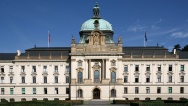Press Advisories
23. 6. 2017 23:04
European statesmen have supported free trade and continued assistance to North African countries in combating illegal migration
EU leaders have agreed on a positive assessment of economic development in Europe, where all EU member states are now showing economic growth. The number of people employed is the highest in history. "I am very pleased that the Czech Republic belongs to the countries with the strongest growth in Europe. We must continue pressuring for wage increases and for equalising the standard of living with that of the Western European countries. It was also the French President Macron with whom we agreed this morning on the need of bringing the living standards across the EU closer together. He clearly supported this goal,” Prime Minister Sobotka said.
The Czech Republic welcomed the discussion on the further heading of the internal market that belongs to the long-term Czech priorities. The internal market is the main economic growth driver of the Union as a whole and one of the basic preconditions for further economic development including the convergence of the standards of living of the member states. "As far as the European Council’s conclusions are concerned, I am very pleased that we have succeeded in obtaining more emphasis on an effective fulfilment of the existing legislation and on implementation of proposals that will contribute to an improvement of the internal market functioning," said Prime Minister Bohuslav Sobotka.
Another topic of today's European Union's meeting of the twenty-eight was free trade – a domain where the Union provides us with a very significant added value by opening up new markets and removing barriers also for the Czech exports. EU leaders have agreed on the need to modernise trade defence instruments that straighten out unequal conditions towards third countries that favour certain sectors in violation of effective trade rules.
What was today also important for the Czech Republic, as the most industrial EU country, was the debate on the role of industrial policy. The Czech Republic has long been calling upon the European Commission to focus on supporting the EU's industrial base. This appeal has succeeded to be reflected in the European Council's conclusions.
Today, EU leaders also talked about migration and a reform of the asylum system. “With the European partners, we have been looking for a solution to the situation on the Mediterranean route as part of the migration debate. We have agreed that there is a need to further support North African countries in the fight against illegal migration. The training of the Libyan Coast Guard, which the Czech Republic actively finances, will be strengthened and we are ready to increase our assistance," the Prime Minister summarised the results of the meeting.
The final issue of the summit was the digital agenda. Even before the European Council, the Czech Prime Minister and 16 other statesmen called on President Donald Tusk to make this issue a regular item on the agenda of the EU summits. The topics of the digital economy will be the priority of the Estonian Presidency of the EU Council over the next six months. The digital agenda will also be addressed during the extraordinary Digital Summit, which will take place in late September in Tallinn.






